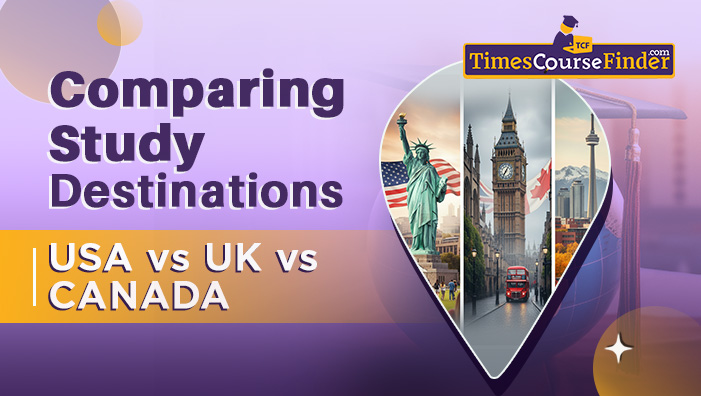
How much does it cost to study in Canada
Canada, known for its stunning landscapes and cultural diversity, offers world-class education in a affordable cost and provide opportunities to the students from all around the world.
 Bisma Shaikh
Bisma Shaikh Studying in Canada is a goal for many students around the world due to its rich academic environment and multicultural appeal. When considering studying in Canada, it's worth noting that tuition fees are typically more affordable than in some other English-speaking countries like the USA, UK and Australia.
Many ambitious international students currently around 807,750 are coming every year to Canada for its exceptional educational opportunities. Understanding the cost to study in Canada is essential for planning a successful educational journey.
That’s why in this article we aim to cover the estimated cost of studying in Canada, covering tuition fees, living expenses, and overall costs, giving you a detailed financial insight to help you achieve your dream of studying in Canada.
Before we explore the financial aspects, let's understand the important aspects of
Why did I choose to study in Canada?
Many students choose to study in Canada for several reasons. They are attracted to the affordable tuition fees, lively campus environment, beautiful scenery, and the prestigious universities like the University of Toronto, University of Alberta, and McGill University.
Here are some top reasons why Canada is a popular study destination:
- Quality Education at Affordable Fees
Canada is known for its high-quality education system that offers excellent academic programs at reasonable tuition fees.
- Recognized Degrees
Canadian universities provide globally recognized degrees that can open doors to diverse career opportunities worldwide.
- Great Quality of Life
Students in Canada enjoy a high standard of living, with access to healthcare, safety, and a multicultural society that embraces diversity.
- Work and Immigration Opportunities
Canada's student-friendly policies make it easier for international students to work part-time during their studies and seek opportunities for permanent residency after graduation.
- Hassle-Free Student Visa Process
Canada's streamlined visa application process simplifies the transition for international students, ensuring a smooth entry into the country.
- Job Prospects
With a great economy and a range of industries, Canada offers promising job prospects for graduates seeking employment post-graduation.
Is Canada cheap to study?
Yes, because studying in Canada is considered an affordable option for international students due to its relatively lower tuition rates compared to other countries. The Canadian education system is renowned for its quality and accessibility, for students seeking a balance between academic excellence and cost-effectiveness.
Additionally, the availability of work and internship opportunities further enhances the appeal of studying in Canada, as students can gain valuable practical experience alongside their academic pursuits.
In terms of financial aspects, studying in Canada allows students to receive a quality education while potentially saving money compared to studying in other countries.
The average tuition costs for international students in Canada typically range from CAD 20,000 to CAD 30,000 per year, making it a cost-effective option for pursuing higher education.
Canada is home to over half a million international students, reflecting the popularity and inclusivity of its education system.
Types of Universities in Canada
Canada's education system is a great opportunity for international students, and in addition to the appealing tuition fees, Canada boasts a diverse range of universities that cater to a wide array of academic passions and teaching approaches.
Here's a breakdown of the main two types of universities you'll consider for Canada:
Public universities Canada
Currently, they have a total of 223 public universities, each offering a diverse range of over 15,000 study programs for students to explore.
These universities play a crucial role in shaping the country's academic landscape and providing international students with a great opportunity to pursue their educational aspirations.
Among these institutions, some are recognized as top performers in academic rankings by respected organizations such as QS World University Rankings and Times Higher Education.
However, a common question that arises is,
Are public universities in Canada free of cost?
In Canada, public universities are not free of cost for international students. It's essential to explore the availability of scholarships for international students. Scholarships can serve as valuable financial aid for students seeking to offset the expenses of studying at public universities in Canada.
However, public universities in Canada typically require international students to pay higher tuition fees, but for this, a scholarship can provide opportunities for financial support and merit-based assistance.
Below, you will find the estimated cost of studying in the top public universities in Canada.
|
Universities |
Estimated Annual Fee |
|
28,900-60,510 CAD/Year |
|
|
9,690-77,994 CAD/Year |
|
|
22,188-64,993 CAD/Year |
|
|
17,708-67,572 CAD/Year |
|
|
6,307-65,428 CAD/Year |
|
|
6,360-54,675 CAD/Year |
Private universities in Canada
Private universities in Canada operate independently of government subsidies, relying on tuition fees, and donations to sustain their operations. With a focus on providing specialized education, private universities often have smaller student populations, resulting in smaller class sizes and a more personalized learning environment.
Despite differences in funding sources, private universities typically have a uniform tuition fee structure for all students, offering more financial aid options to international students compared to public universities.
Private institutions offer a range of undergraduate, postgraduate, and doctoral programs, emphasizing traditional education formats to cater to diverse academic needs.
Cost of study in private universities in Canada
Here are some of the top private universities and colleges in Canada to discover their academic offerings, tuition fees, and unique educational opportunities.
|
Universities |
Estimated Annual Fee |
|
8,250-22,800 CAD/Year |
|
|
22,664 CAD/Year |
|
|
18,000-23,392 CAD/Year |
|
|
23,820-30,864 CAD/Year |
|
|
11,800 CAD/Year |
|
|
9,594-36,332 CAD/Year |
What are the cheapest courses in Canada?
When considering studying in Canada, exploring the affordability of different courses can be a smart financial move to make your academic aspirations a reality. Many universities offer a range of short and cost-effective courses that can be beneficial for international students.
Below, you will find a table detailing some of the cheapest courses in Canada, helping you gain a better understanding of your financial options and making your dream of studying in Canada more achievable.
|
Universities |
Estimated Annual Fee |
Available courses |
|
9,74-19,493 CAD/Year |
Architecture, Engineering, Business & Management , Computer & IT |
|
|
4,833-20,790 CAD/Year |
||
|
5,899-17,946 CAD/Year |
||
|
6,830-15,850 CAD/Year |
||
|
15,046-18,090 CAD/Year |
||
|
6,730-8,076 CAD/Year |
What are the cheapest universities in Canada for international students?
When it comes to pursuing higher education in Canada, affordability is a key factor for many international students. To help you navigate the cost of studying in Canada, here is a list of the top 5 most budget-friendly universities for international students.
Here is the table below for a quick overview of the annual fees at these affordable Canadian universities
|
Universities |
Estimated Annual Fee |
|
15,307-49,665 CAD/Year |
|
|
6,198-33,046 CAD/Year |
|
|
16,960-25392 CAD/Year |
|
|
16,215-19433 CAD/Year |
|
|
7,520-40,800 CAD/Year |
|
|
13,120-49,110 CAD/Year |
Qualification-wise estimated course fees per year to study in Canada
It's essential to understand the estimated course fees per year, as costs can differ based on the study level and program type you select.
Here are the estimated course fees based on the qualification-wise
|
Qualification |
Estimated Courses Annual Fee |
|
9,537-71,102 CAD/Year |
|
|
6,198-62,633 CAD/Year |
|
|
4,497-23,240 CAD/Year |
Every year intakes in Canada
In Canada, academic institutions typically follow a structured intake schedule known as terms or semesters. These terms are consistent each academic year and provide students with various opportunities to begin their studies.
The table below outlines the three primary intakes offered by Canadian universities:
|
Intakes |
Duration |
|
September or Fall or Autumn |
December - March |
|
January or Winter |
September - November |
|
May or Spring or Summer |
January - February |
Living expenses in Canada as an international student
Living expenses in Canada for international students can vary depending on the city and individual budget. On average, students can expect to spend between CAD 15,000 and CAD 20,000 per year, excluding university tuition fees. It's important to plan your budget wisely to cover basic expenses while studying in Canada.
Let's explore some common expenses that international students may encounter in Canada.
|
Category |
Average Costs per month |
|
Accommodation |
Homestays: 400 – 800 CAD/Per Year Dormitory: 3,000 – 7,500 CAD/Per Year Renting: 941.67 – 2,250 CAD/Per Year |
|
Transportation |
1,400-3,000 CAD/Per Year |
|
Food |
2,400-3,600 CAD/Per Year |
|
Miscellaneous |
7,200-8,400 CAD/Per Year |
Canada most expensive cities by cost to live in as a student
Certain cities in Canada have higher living expenses across various aspects compared to other regions in the country.
Explore the table below for insights into the cities where rent costs notably higher for students.
|
Cities |
Estimated rent cost |
|
Ottawa |
1,964-2,446 CAD/per month |
|
Victoria |
1,390-1,590 CAD/per month |
|
Toronto |
2,260-2,850 CAD/per month |
|
Vancouver |
2,130-3,230 CAD/per month |
|
Montreal |
1,500 -1,780 CAD/per month |
Typical expenses of utilities and other bills in Canada
Basic Utilities(Electricity, Water, Heating, Garbage) bills
The average monthly cost for basic utilities such as electricity, water, heating, and garbage in Canada is around 150 CAD.
Internet bills
Internet bills in Canada typically range from 50 to 70 CAD per month. Many educational institutions offer free Wi-Fi access, and additional Internet services can be found at Internet cafes, public libraries, or on-campus facilities. It's advisable to check the network security before connecting to ensure a safe online experience.
Mobile bills
Well, it ranges from CAD 10 to $110 monthly, with around $40-$60 for decent data (10GB) and unlimited talk/text. Canada has higher data costs (around CAD 7.36/GB), so consider Mobile virtual network operators (MVNOs), prepaid plans, or bundled packages to save money.
What is the average cost of basic groceries in Canada?
Keeping your grocery bill in check as an international student is key. Canada offers a variety of affordable grocery stores to help you stretch your budget.
Here are some of the popular store names below that will help you get groceries in a budget-friendly rates
Here are the average prices for some basic food items:
|
Item |
Average Cost |
|
Milk (1 liter) |
1.68 CAD |
|
White bread (500g) |
1.50 CAD |
|
Eggs (12) |
3.87 CAD |
|
Rice (1kg, white) |
3.25 CAD |
|
Beef (1kg) |
14.24 CAD |
|
Potato (1kg) |
2.61 CAD |
|
Onion (1kg) |
5.47 CAD |
|
Tomato (1kg) |
5.38 CAD |
|
Chicken (1kg) |
6.99 CAD |
|
Apples (1kg) |
4.33 CAD |
|
Oranges (1kg) |
3.92 CAD |
|
Banana (1kg) |
1.67 CAD |
Understanding these average costs can provide you with an idea of what to anticipate when it comes to grocery shopping in Canada. Opting to cook at home and make thoughtful decisions can assist you in managing your budget effectively while relishing delightful and nutritious meals.
What’s the cost of health insurance?
While in Canada the basic medical services are covered by the public system, international students typically require additional private health insurance to cover non-essential services like dental care, vision care, and prescription medicines. The cost of this student health insurance typically ranges from CAD 300 to CAD 800 per year, depending on the specific coverage chosen.
Here are some of the leading insurance companies in Canada that offer student health insurance plans include:
Canadian student's visa cost
Securing your Canadian student visa, also known as a study permit, marks the exciting first step. The application process typically involves submitting a few key documents:
University Acceptance Letter
This official document from your chosen Canadian university confirms your enrollment in a designated learning institution (DLI).
Valid Passport or Travel Document
Ensure your passport is valid for the duration of your intended stay in Canada, with some additional validity recommended.
Proof of Financial Support
This demonstrates your ability to cover tuition fees and living expenses while studying in Canada. Accepted forms of proof can include bank statements, scholarship awards, or letters of financial support from a sponsor.
If you are confused about how to complete all these steps, you can seek help from Times Consultant to streamline the study abroad process in Canada. They also offer free online counseling session to provide you with a better understanding of the procedures for studying in Canada.
Furthermore, there’s one common question that arises in everyone's mind is
Do I have to pay taxes as an international student in Canada?
Yes, because international students in Canada are considered taxable residents, or if they have Canadian income, they’re required to file a Canadian income tax return.
The responsibility of completing and submitting personal tax returns lies with individuals in Canada. Even if international students do not have any income in Canada, they may still need to file a tax return, whether they are in the country part-time or year-round.
As we cover the essential components of the anticipated expenses for study in Canada as a student, it becomes evident that managing all costs can pose a significant challenge. Nonetheless, there are also
Tips to Manage the Cost of Studying in Canada
Maintaining financial stability throughout your studies in Canada is essential for a smooth experience. Thoughtfully managing your expenses can help you identify what is affordable and gauge how much income you may need while studying in Canada.
Here are some tips to assist in financing your education in Canada.
-
Scholarships in Canada for international students
International students pursuing higher education in Canada benefit from a range of scholarships that acknowledge merit, academic standing, and active engagement. These scholarships are there to ease the financial burden on students and cover various expenses, including tuition fees, travel, and accommodation.
As international students, you have access to a multitude of scholarship opportunities in Canada designed specifically to support your educational journey.
Here are the few different institutes in Canada that provide scholarships there
- 2Nd Program Scholarship
- 7000 Entrance Scholarship
- Abdul Majid Bader Graduate Scholarship
- Ben March Memorial Scholarship
- Carleton University Scholarships Of Excellence
Additionally, you can explore an extensive selection of over 300+ Canada scholarships available on our website.
-
Part-time jobs in Canada for international students
International students in Canada can supplement their income through part-time jobs, offering valuable work experience alongside their studies. While regulations limit on-campus work to full-time students with a valid study permit, a variety of off-campus opportunities exist.
These jobs typically offer wages ranging from minimum wage to 25 CAD per hour, with some skilled positions reaching even higher rates.
Here are some of the part-time jobs available to international students.
|
Category |
Jobs Roles |
|
On campus |
Library assistant Research assistants Cafeteria Staff member Administrative Assistant Tutorial Assistant |
|
Off-campus |
Waiter Cashier Courier services Chef sales assistants IT support Software engineer Data Analyst PHP developer Python developer Web developer Retail Sales Associate Customer Service Representative Data Entry Clerk Social Media Assistant Content Writing/Editing |
-
Discounts for International Students in Canada
Experience in Canada extends beyond the classroom, offering international students exciting opportunities to explore and save. An International Student Identity Card (ISIC) unlocks a world of discounts on various everyday expenses, making your Canadian adventure more budget-friendly.
Here are a few companies that give discounts there for international students:
Retail: Enjoy deals at popular clothing stores like Adidas, Topshop, GAP, Nike, and H&M.
Travel: Save on flights, accommodation, and tours with discounts from Air Canada, Booking.com, Viator, and Flight Centre.
Tech: Score deals on electronics and gadgets from Apple, HP, Lenovo, and Samsung.
Food & Entertainment: Treat yourself to discounted meals at Subway, McDonald's, Burger King, and KFC, or grab savings on cosmetics from MAC and Urban Decay.
-
Make a list of income and expenses
Creating a comprehensive budget is the basis of effective financial management. To get started, develop a list that tracks both your income sources (scholarship, tuition fees, part-time jobs, etc.) and all your anticipated expenses (rent, groceries, transportation, entertainment).
By tracking your expenses, you can identify areas where you might be able to cut back and free up additional funds.
-
Shop second-hand to cut your expenses
By shopping through second-hand product shops you can not only stretch their budgets but also contribute to a more sustainable lifestyle.
Conclusion
When considering the costs of study in Canada, it's important to factor in tuition fees, living expenses, and potential scholarships or financial aid options. By understanding these financial aspects, you can better plan for a successful academic journey in Canada.
To further streamline your decision-making process and ensure you make the most informed choices regarding your academic path in Canada, consider exploring the best course for you through our website TimesCourseFinder. You will get valuable insights and compare courses, helping you select the right program within your budget.
Also, for personalized guidance and support in selecting an affordable city in Canada that aligns with your financial constraints and academic goals, you may also benefit from scheduling a free counseling session with TimesConsultant. Their expertise assists you in navigating the complexities of studying abroad and finding a city that enhances your overall experience in Canada.




